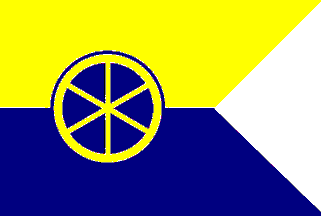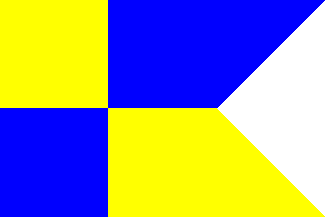
Last modified: 2018-12-19 by rob raeside
Keywords: trnava | wheel | christogram |
Links: FOTW homepage |
search |
disclaimer and copyright |
write us |
mirrors
 image from this site, reported
by Aleš Křížan, 24 May 2002
image from this site, reported
by Aleš Křížan, 24 May 2002
![[Trnava mayor's flag]](../images/s/sk-tt_tt.jpg) image from this site, reported
by Aleš Křížan, 24 May 2002
image from this site, reported
by Aleš Křížan, 24 May 2002
![[Trnava Coat of Arms with Christogram]](../images/s/sk-tt)tt.jpg) image from this site, reported
by Aleš Křížan, 24 May 2002
image from this site, reported
by Aleš Křížan, 24 May 2002
 submitted through Rob Raeside, 6 Aug 1999
submitted through Rob Raeside, 6 Aug 1999
Trnava - Hungarian: Nagyszombat = 'great Saturday', because the city
market was on saturdays, in German Tyrnau - has 71.783 inhabitants,
nearly all Slovakian. In 1910 15.163 inhabitants (53,0% Slovakians, 30,3%
Hungarians and 15,0% Germans). The town was in Pozsony (Slovakian: Prešporok)
County of Hungary till 1919/1920. 1920-1938 in Czechoslovakia, 1939-1945
in Slovakia, and 1945-1992 in Czechoslovakia. First mentioned in 1211.
Civic rights in 1238 by King Béla IV.
István Molnár, 20 Jun 2000
![[Trnava medieval flag]](../images/s/sk-ttold.gif) by Jan Kravcík, 15 June 2000
by Jan Kravcík, 15 June 2000
This is the medieval flag of the city .
Jan Kravcík, 15 June 2000
trnov.gif) from http://www.tatrahome.sk/revue/erby/ . (!Link does not work any more!)
from http://www.tatrahome.sk/revue/erby/ . (!Link does not work any more!)
Origin/Meaning:
The original symbol for the city, dating from the early 14th century,
was a wheel with the head of Jesus in the middle. Between the spokes the
Greek letters alpha and omega, a star and a crescent were placed. The smaller
symbols disappear in the early 15th century and from 1420 onwards only
the wheel is used. The wheel has no special meaning, but the spokes form
the letters I and X, Greek for Jesus Christ. (Source: Ralf
Harteminks's website)